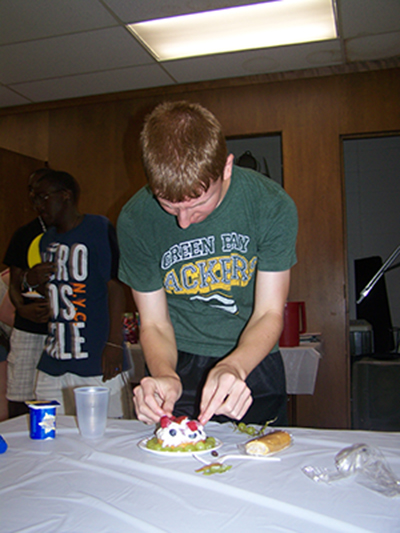Food Programs Appeal to Library Patrons
Everyone knows one of the best ways to get patrons to attend a program is to include food. Well, why not make food the main focus of the program? There are many ways to do this, and food programs can be used for almost any age group. Some food-based programs can be expensive, but some can be done for a smaller budget.
One idea that has been popular at my library (Benton Harbor, Michigan) is to host an Iron Chef type of event. This program is based on the Food Network television show where two chefs face off making dishes centered on a secret ingredient. To make the program more suited to the library, allow patrons to work in teams and have multiple teams face off against one another. On the show the chefs have an hour to prepare their food once the secret ingredient has been announced and I’ve kept to that when running this program at the library, although you could reduce the amount of cooking time if needed. To ensure safety I’ve limited this program to “cooking” with a microwave or a blender. If a team needs to use either appliance, a team member must bring the dish to a library worker, and the staff member will either blend or microwave the item for the patron. This program can be expensive depending on how many ingredients you offer the patrons to use. I’ve run this program three times with the teens at my library and so far the secret ingredients we’ve used have been marshmallows, chips/pretzels/popcorn, and fruit. We usually have at least 30 teens participate each summer.
Another program that can be done with all ages, although it might appeal more to children and teens is cookie decorating. This program is pretty straight forward, the librarian needs to get a large amount of sugar cookies, frosting, and other cookie decorating materials, and allow patrons to come in and decorate the cookies. A librarian could buy sugar cookies from the store or bake them him or herself and bring them in. This program could also be done with cupcakes, or any other baked food that can be decorated.
One food-based program I’ve heard about at conferences, but have not tried at my library yet, is a chocolate party. During a chocolate party library patrons celebrate chocolate and its awesomeness. This can be done with a chocolate tasting, or a candy bar trivia game (patrons blindly taste candy bars and see how many they can guess correctly). A chocolate party could also include cookie or cupcake decorating, other chocolate related trivia, and anything chocolate related that a librarian can think of to include.
An unusual food-based program we’ve hosted at the Benton Harbor Public Library was a food tasting program where teens got to try foods that people with sensitivities and allergies need to eat. This included foods like lactose free ice cream, almond butter, soy milk, gluten free items, and vegetarian food. This was a very positive program and the teens were very receptive to the new foods. The reason we hosted this program was because I have a food allergy, and the teens wanted to know more about it. I thought this would be a way they could learn more about my food allergy and also other food allergies and considerations.
Last, libraries can host instructional cooking programs. The librarian can invite a local chef or professor from a local culinary program to come and teach patrons how to cook. This program could be scaled up or down based on the library setting and the age group that it is designed for. Some local libraries have hosted programs to teach patrons about making food for parties and other gatherings.
There are many food-based programs that can be held in the library. The only limit to these programs is the librarian’s imagination. There are many resources for this type of program online. Mid-Hudson Library System has a page that includes a large amount of creative programming ideas, and one of their creative programming categories is food-based programming. The American Library Association also has a site dedicated to programs for school-aged kids, and this site includes a couple food-based programs. Movie Licensing USA also has a website that includes food-related programming ideas. These programs are broken up into categories for children, teens, and adults. Again, Pinterest can be a great resource for food based programs. Almost any Pinterest board dedicated to teen programming includes at least a few food based program ideas.










